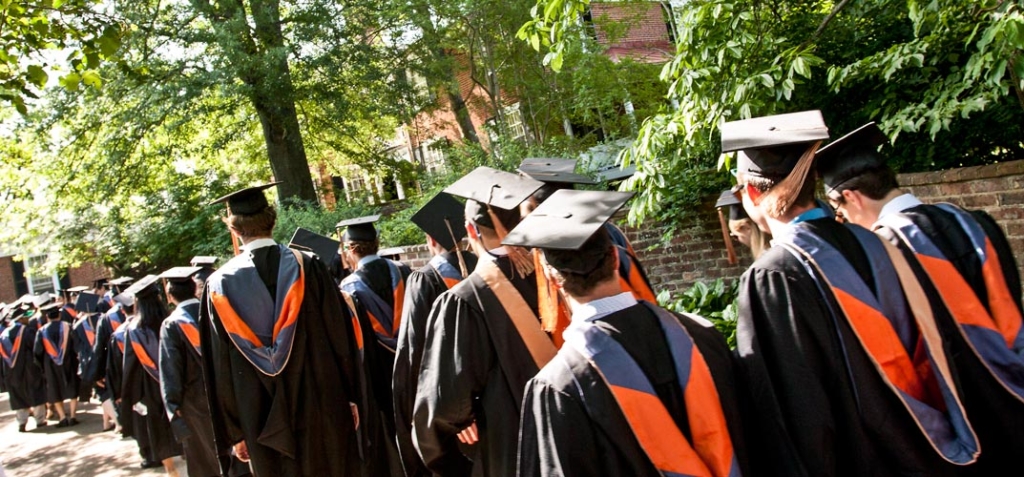
UVA McIntire Grads. Courtesy photo
Doing the right thing will always result in the right outcomes. That’s the philosophy that guides the curriculum team at the University of Virginia’s McIntire School of Commerce — and it’s paying off. Three of the school’s programs, the B.S. in Commerce, M.S. in Commerce, and M.S. in the Management of Information Technology (M.S. in MIT), will officially receive STEM designations this spring semester. To the team behind this accomplishment, it wasn’t about changing curriculums, but about gaining recognition for their already STEM-heavy classes.
A DECADE-LONG TRANSFORMATION
According to Trey Maxham, McIntire’s Associate Dean for Graduate Programs, the two-year designation process was “quite the adventure.” But the achievement wouldn’t have been possible without a turning point in curriculum in 2009.
Ten years ago, Maxwell and his team set upon the question: how do we provide the right skills for our students so they get the best outcomes? They turned to the school’s corporate partners, recruiters, and alumni for answers. What abilities were they seeking in employees? What skills did alumni wish they had now?
Across all groups the same emphasis on technical, analytical, and quantitative skills rose to the surface. This led the school to reframe its curriculum and bring on more professors adept in these areas. It didn’t take long before churning out students highly proficient in these skills became McIntire’s trademark.
WHERE IT ALL STEMs FROM
Luckily for McIntire, technical, analytical, and quantitative skills are all major wheelhouses of a STEM education, an acronym that stands for science, technology, engineering, and math.
“I was exploring STEM-designated degrees and came to the realization that we were offering similar classes with similar rigor in similar fields,” Maxham tells Poets&Quants for Undergrads. “From there it became my goal to learn as much as I could about the process to achieving this designation.”
The first big step for Maxham was figuring out who he needed to impress. It turned out that each state in the U.S. differs on how to determine eligibility. To earn the designation in Virginia, it meant Maxham had to learn the CIP code system and create program proposals for the state’s university governing body to review.
“In each proposal we had to do an analysis of each class, across every program, to see what coursework fell into the STEM designation requirements,” explains Maxham.
While perfecting the proposals to the state’s liking took over a year, the effort was well worth it. The school is now among the first, if not the first, non-specialized undergraduate business degree and masters in management program to receive the STEM designation.
“A significant orientation toward technical, analytical, and quantitative skill development is a longstanding hallmark of all our curricula, and these STEM designations are a reflection of our strategic focus,” says Carl Zeithaml, Dean of the McIntire School of Commerce.
ATTRACTING TALENT NEAR AND FAR
These designations couldn’t come at a better time. Amazon recently announced that one half of their second headquarters will be built in Arlington, Virginia, only two hours from Charlottesville, where UVA is located. Offering STEM programs will further McIntire’s ambitions to recruit the best of the best.
“If you look at what Amazon needs for their workforce, they want people who have the analytical and technical skills, the skills we’re teaching in these programs,” says Zeithaml.
This designation will also likely attract more eyes from international students. Students with F-1 visa status enrolled in STEM-designated programs have the ability to live in the U.S. longer following graduation. They are also eligible to apply for a 24-month extension for optional practical training (OPT). Typically, international students can only apply for 12 months.
“This opportunity sends a signal to the top international students that your job opportunities will be enhanced if you go here [McIntire],” informs Zeithaml. “It also sends a message that we care and value their contribution.”
The news was posted on McIntire’s WeChat account from the China-based office and it received over 1,000 hits in only a few days. “That indicates that people, not only from China, but from all over the world, will pay attention to this news and see the opportunity in this,” Zeithaml points out.
STEM TODAY, WHERE TOMORROW?
The McIntire team isn’t done yet. They still have several proposals for other programs being examined by the state — and eyes set on the future.
“It never stops. We’re thankful to get this today, but who knows what the landscape will look like going ahead,” states Maxham. “If we rely on our students, alumni and community members for guidance, we’ll continue to unveil future important topics and be a leader.”
DON’T MISS: B-SCHOOL OF THE YEAR: VIRGINIA’S MCINTIRE SCHOOL OF COMMERCE











Questions about this article? Email us or leave a comment below.